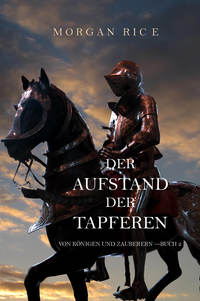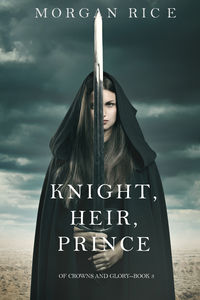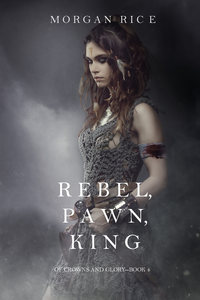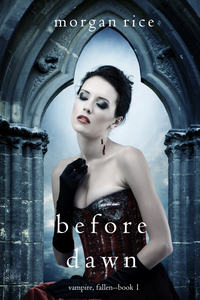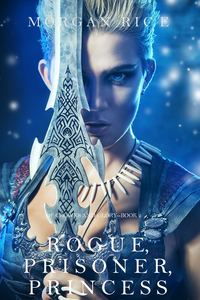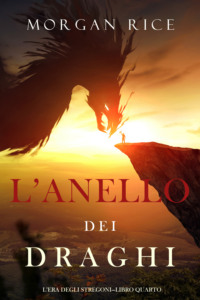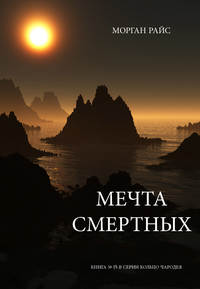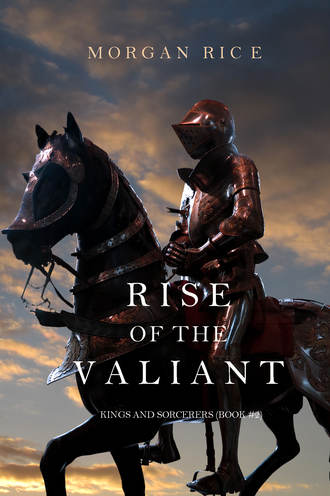
Полная версия
Rise of the Valiant
Behind her, soldiers rushed forward with keys, unlocking its chains. All the while the beast never took his angry eyes off her, snarling, as if summing her up, as if daring her.
As soon as it was unchained, the beast stomped his legs, as if threatening to attack.
But, strangely, it did not. Instead, it stared at Kyra, fixing its eyes on her, and slowly its look of anger seemed to morph to one of tolerance. Perhaps even gratitude.
Ever so slightly, it seemed to lower its head; it was a subtle gesture, almost unnoticeable, yet one she could decipher.
Kyra stepped forward, held its mane, and in one quick motion mounted it.
A gasp filled the room.
At first the beast shivered and began to buck. But Kyra sensed it was for show. It didn’t really want to throw her off – it just wanted to make a point of defiance, of who was in control, to keep her on edge. It wanted to let her know it was a creature of the wild, a creature to be tamed by no one.
I do not wish to tame you, she said to it in her mind’s eye. I wish only to be your partner in battle.
The Solzor calmed, still prancing, but not as wildly, as if hearing her. Soon, it stopped moving, perfectly still beneath her, snarling out at the others, as if to protect her.
Kyra, sitting atop the Solzor, now calm, looked down at the others. A sea of shocked faces stared back, mouths agape.
Kyra slowly smiled wide, feeling a great sense of triumph.
“This,” she said, “is my choice. And his name is Andor.”
* * *Kyra rode Andor at a walk down the center of the courtyard of Argos, and all her father’s men, hardened soldiers, stopped and watched in awe as she went. Clearly, they had never seen anything like it.
Kyra held his mane gently, trying to pacify him as he snarled softly at all the men, glaring them down, as if he held a vendetta for being caged. Kyra adjusted her balance, Baylor having put a fresh leather saddle on him, and tried to get used to riding up so high. She felt more powerful with this beast beneath her than she’d ever had.
Beside her, Dierdre rode a beautiful mare, one Baylor had chosen for her, and the two of them continued through the snow until Kyra spotted her father in the distance, standing there by the gate, awaiting her. He stood with his men, all of them waiting to see her off, and they, too, looked up at her in fear and awe, stunned that she could ride this animal. She saw the admiration in their eyes, and it emboldened her for the journey ahead. If Theos would not return to her, at least she had this magnificent creature beneath her.
Kyra dismounted as she reached her father, guiding Andor by his mane and seeing the concern flicker in her father’s eyes. She did not know if it was because of this beast or for the journey ahead. His look of concern reassured her, made her realize she was not the only one who feared what lay ahead, and that he cared for her after all. For the briefest moment he let his guard down and shot her a look that only she could recognize: the love of a father. She could tell that he struggled in sending her on this quest.
She stopped a few feet away, facing him, and all grew silent as the men gathered around to watch the exchange.
She smiled up at him.
“Do not worry, Father,” she said. “You raised me to be strong.”
He nodded back, pretending to be reassured – yet she could see he was not. He was still, most of all, a father.
He looked up, searching the skies.
“If only your dragon would come for you now,” he said. “You could cross Escalon in but a few minutes. Or better – he could join you on your journey and incinerate anyone who came in your path.”
Kyra smiled sadly.
“Theos is gone now, Father.”
He looked back at her, eyes filled with wonder
“Forever?” he asked, the question of a warlord leading his men into battle, needing to know but afraid to ask.
Kyra closed her eyes and tried to tune in, to get a response. She willed for Theos to answer her.
Yet there came a numbing silence. It made her wonder if her she had ever had a connection to Theos to begin with, or if she had only imagined it.
“I do not know, Father,” she answered honestly.
He nodded back, accepting, the look of a man who had learned to accept things as they were and to rely on himself.
“Remember what I – ” her father began.
“KYRA!” an excited shout cut through the air.
Kyra turned as the men parted ways, and her heart lifted with delight to see Aidan running through the city gates, Leo at his side, jumping down from a cart driven by her father’s men. He ran right for her, stumbling through the snow, Leo even faster, way ahead of him, and already bounding ahead into Kyra’s arms.
Kyra laughed as Leo knocked her down, standing on her chest on all fours and licking her face again and again. Behind her, Andor snarled, already protective of her, and Leo jumped up and faced off with it, snarling back. They were two fearless creatures, each equally protective of her, and Kyra felt honored.
She jumped up and stood between them, holding Leo back.
“It’s okay, Leo,” she said. “Andor is my friend. And Andor,” she said, turning, “Leo is mine, too.”
Leo backed down reluctantly, while Andor continued to snarl, albeit in a quieter fashion.
“Kyra!”
Kyra turned as Aidan ran into her arms. She reached down and hugged him tight as his little hands clutched her back. It felt so good to embrace her little brother, whom she was certain she would never see again. He was the one bit of normalcy left in the whirlwind her life had become, the one thing that had not changed.
“I heard you were here,” he said in a rush, “and I caught a ride to see you. I’m so happy you’re back.”
She smiled sadly.
“I’m afraid not for long, my brother,” she said.
A flash of concern crossed his face.
“You’re leaving?” he asked, crestfallen.
Her father interjected.
“She is off to see her uncle,” he explained. “Let her go now.”
Kyra noted that her father said her uncle and not your uncle, and she wondered why.
“Then I shall join her!” Aidan insisted proudly.
Her father shook his head.
“You shall not,” he replied.
Kyra smiled down at her little brother, so brave, as always.
“Father needs you elsewhere,” she said.
“The battlefront?” Aidan asked, turning to their father hopefully. “You are setting out for Esephus,” he added in a rush. “I have heard! I want to join you!”
But he shook his head.
“It is Volis for you,” he replied. “You will stay there, protected by the men I leave behind. The battlefront is no place for you now. One day.”
Aidan flushed red with disappointment.
“But I want to fight, Father!” he protested. “I don’t need to stay boarded up in some empty fort with women and children!”
His men snickered, but her father looked serious.
“My decision is made,” he answered curtly.
Aidan frowned.
“If I can’t join Kyra and I can’t join you,” he said, refusing to let it go, “then what use is my learning about battles, learning how to use weapons? What has all my training been for?”
“Grow hair on your chest first, little brother,” Braxton laughed, stepping forward, Brandon beside him.
Laughter arose amidst the men and Aidan reddened, clearly embarrassed in front of the others.
Kyra, feeling bad, knelt before him and looked at him, placing a hand on his cheek.
“You shall be a finer warrior than all of them,” she reassured him softly, so that only he could hear. “Be patient. In the meantime, watch over Volis. It needs you, too. Make me proud. I shall return, I promise, and one day we shall fight great battles together.”
Aidan seemed to soften a bit, as he leaned forward and hugged her again.
“I don’t want you to go,” he said softly. “I had a dream about you. I dreamt…” He looked up at her reluctantly, eyes filled with fear. “…that you would die out there.”
Kyra felt a shock at his words, especially as she saw the look in his eyes. It haunted her. She did not know what to say.
Anvin stepped forward and draped over her shoulders thick, heavy furs, warming her; she stood and felt ten pounds heavier, but it shut out all the wind and took away the chill down her back. He smiled back.
“Your nights will be long, and fires shall be far away,” he said, and gave her a quick embrace.
Her father stepped forward quickly and embraced her, the strong embrace of a warlord. She hugged him back, lost in his muscles, feeling safe and secure.
“You are my daughter,” he said firmly, “don’t forget that.” He then lowered his voice so the others could not hear, and added: “I love you.”
She was overwhelmed with emotions, but before she could reply he quickly turned and hurried away – and at the same moment Leo whined and jumped up on her, nudging his nose into her chest.
“He wants to go with you,” Aidan observed. “Take him – you’ll need him far more than I, shuttered up in Volis. He’s yours anyway.”
Kyra hugged Leo, unable to refuse as he would not leave her side. She felt comforted by the idea of his joining her, having missed him dearly. She could use another set of eyes and ears, too, and there was no one more loyal than Leo.
Ready, Kyra mounted Andor as her father’s men parted ways. They held up torches of respect for her all along the bridge, warding off the night, lighting a path for her. She looked out beyond them and saw the darkening sky, the wilderness before her. She felt excitement, fear, and most of all, a sense of duty. Of purpose. Before her lay the most important quest of her life, a quest that had at stake not only her identity, but the fate of all of Escalon. The stakes could not be higher.
Her staff strapped over one shoulder, her bow over the other, Leo and Dierdre beside her, Andor beneath her, and all her father’s men watching, Kyra began to ride Andor at a walk toward the city gates. She went slowly at first, through the torches, past the men, feeling as if she were walking into a dream, walking into her destiny. She did not look back, not wanting to lose resolve. A low horn was sounded by her father’s men, a horn of departure, a sound of respect.
She prepared to give Andor a kick – but he already anticipated her. He began to run, first at a trot, then a gallop.
Within moments Kyra found herself racing through the snow, through the gates of Argos, over the bridge, into the open field, the cold wind in her hair and nothing before her but a long road, savage creatures, and the falling blackness of night.
Chapter Four
Merk ran through the wood, stumbling down the dirt slope, weaving between trees, the leaves of Whitewood crunching beneath him as he ran for all he had. He looked ahead and kept in his sights the distant plumes of smoke filling the horizon, blocking out the blood-red sunset, and he felt a rising sense of urgency. He knew the girl was down there somewhere, possibly being murdered even at this moment, and he could not make his legs run fast enough.
Killing seemed to find him; it encountered him at every turn, on seemingly every day, the way other men were summoned home for dinner. He had a date with death, his mother used to say. Those words rang in his head, had haunted him for most of his life. Were her words self-fulfilling? Or had he been born with a black star over his head?
Killing for Merk was a natural part of his life, like breathing or having lunch, no matter who he was doing it for, or how. The more he pondered it, the more he felt a great sense of disgust, as if he wanted to vomit his entire life. But while everything inside him screamed at him to turn around, to start life anew, to continue on his pilgrimage for the Tower of Ur, he just could not do it. Violence was, once again, summoning him, and now was not the time to ignore its call.
Merk ran, the billowing clouds of smoke getting closer, making it harder to breathe, the smell of smoke stinging his nostrils, and a familiar feeling began to overtake him. It was not fear or even, after all these years, excitement. It was a feeling of familiarity. Of the killing machine he was about to become. It was always what happened when he went into battle – his own, private battle. In his version of battle, he killed his opponent face to face; he didn’t have to hide behind a visor or armor or a crowd’s applause like those fancy knights. In his view, his was the most courageous battle of all, reserved for true warriors like himself.
And yet as he ran, something felt different to Merk. Usually, Merk did not care who lived or died; it was just a job. That kept him clear to reason, free from being clouded emotionally. Yet this time, it was different. For the first time in as long as he could remember, no one was paying him to do this. He proceeded of his own volition, for no other reason than because he pitied the girl and wanted to set wrongs right. It made him invested, and he did not like the feeling. He regretted now that he had not acted sooner and had turned her away.
Merk ran at a steady clip, not carrying any weapons – and not needing to. He had in his belt only his dagger, and that was enough. Indeed, he might not even use it. He preferred to enter battle weaponless: it threw his opponents off-guard. Besides, he could always strip his enemy’s weapons and use them against them. That left him with an instant arsenal everywhere he went.
Merk burst out of Whitewood, the trees giving way to open plains and rolling hills, and was met by the huge, red sun, sitting low on the horizon. The valley spread out before him, the sky above it black, as if angry, filled with smoke, and there, aflame, sat what could only be the remnants of the girl’s farm. Merk could hear it from here, the gleeful shouts of men, criminals, their voices filled with delight, bloodlust. With his professional eye he scanned the scene of the crime and immediately spotted them, a dozen men, faces lit by the torches they held as they ran to and fro, setting everything aflame. Some ran from the stables to the house, setting torches to straw roofs, while others slaughtered the innocent cattle, hacking them down with axes. One of them, he saw, dragged a body by the hair across the muddy ground.
A woman.
Merk’s heart raced as he wondered if it was the girl – and if she were dead or alive. He was dragging her to what appeared to be the girl’s family, all of them tied to the barn by ropes. There were her father and mother, and beside them, likely her siblings, smaller, younger, both girls. As a breeze moved a cloud of black smoke, Merk caught a glimpse of the body’s long blonde hair, matted with dirt, and he knew that was her.
Merk felt a rush of adrenaline as he took off at a sprint down the hill. He rushed into the muddy compound, running amidst the flame and the smoke, and he could finally see what was happening: the girl’s family, against the wall, were all already dead, their throats cut, their bodies hanging limply against the wall. He felt a wave of relief as he saw the girl being dragged was still alive, resisting as they dragged her to join her family. He saw a thug awaiting her arrival with a dagger, and he knew she would be next. He had arrived too late to save her family – but not too late to save her.
Merk knew he had to catch these men off-guard. He slowed his gait and marched calmly down the center of the compound, as if he had all the time in the world, waiting for them to take notice of him, wanting to confuse them.
Soon enough, one of them did. The thug turned immediately, shocked at the sight of a man walking calmly through all the carnage, and he yelled to his friends.
Merk felt all the confused eyes on him as he proceeded, walking casually toward the girl. The thug dragging her looked over his shoulder, and at the sight of Merk he stopped, too, loosening his grip and letting her fall in the mud. He turned and approached Merk with the others, all closing in on him, ready to fight.
“What do we have here?” called out the man who appeared to be their leader. It was the one who had dropped the girl, and as he set his sights on Merk he drew a sword from his belt and approached, as the others encircled him.
Merk looked only at the girl, checking to make sure she was alive and unharmed. He was relieved to see her squirm in the mud, slowly collecting herself, lifting her head and looking back out at him, dazed and confused. Merk felt relief that he had not, at least, been too late to save her. Perhaps this was the first step on what would be a very long road to redemption. Perhaps, he realized, it did not start in the tower, but right here.
As the girl turned over in the mud, propping herself up on her elbows, their eyes met, and he saw them flood with hope.
“Kill them!” she shrieked.
Merk stayed calm, still walking casually toward her, as if not even noticing the men around him.
“So you know the girl,” the leader called out to him.
“Her uncle?” one of them called out mockingly.
“A long-lost brother?” laughed another.
“You coming to protect her, old man?” another mocked.
The others burst into laughter as they closed in.
While he did not show it, Merk was silently taking stock of all his opponents, summing them up out of the corner of his eye, tallying how many they were, how big they were, how fast they moved, the weapons they carried. He analyzed how much muscle they had versus fat, what they were wearing, how flexible they were in those clothes, how fast they could pivot in their boots. He noted the weapons they held – the crude knives, daggers drawn, swords poorly sharpened – and he analyzed how they held them, at their sides or out in front, and in which hands.
Most were amateur, he realized, and none of them truly concerned him. Save one. The one with the crossbow. Merk made a mental note to kill him first.
Merk entered a different zone, a different mode of thinking, of being, the one that always naturally gripped him whenever he was in a confrontation. He became submerged in his own world, a world he had little control over, a world he gave his body up to. It was a world that dictated to him how many men he could kill how quickly, how efficiently. How to inflict the maximum damage with the least possible effort.
He felt bad for these men; they had no idea what they were walking into.
“Hey, I’m talking to you!” their leader called out, hardly ten feet away, holding out his sword with a sneer and closing in fast.
Merk stayed the course, though, and kept marching, calm and expressionless. He was staying focused, hardly listening to their leader’s words, now muted in his mind. He would not run, or show any signs of aggression, until it suited him, and he could sense how puzzled these men were by his lack of actions.
“Hey, do you know you’re about to die?” the leader insisted. “You listening to me?”
Merk continued walking calmly while their leader, infuriated, waited no longer. He shouted in rage, raised his sword, and charged, swinging down for Merk’s shoulder.
Merk took his time, not reacting. He walked calmly toward his attacker, waiting until the very last second, making sure not to tense up, to show any signs of resistance.
He waited until his opponent’s sword reached its highest point, high above the man’s head, the pivotal moment of vulnerability for any man, he had learned long ago. And then, faster than his foe could possibly foresee, Merk lunged forward like a snake, using two fingers to strike at a pressure point beneath the man’s armpit.
His attacker, eyes bulging in pain and surprise, immediately dropped the sword.
Merk stepped in close, looped one arm around the man’s arm and tightened his grip in a lock. In the same motion he grabbed the man by the back of his head and spun him around, using him as a shield. For it wasn’t this man that Merk had been worried about, but the attacker behind him with the crossbow. Merk had chosen to attack this oaf first merely to gain himself a shield.
Merk spun and faced the man with the crossbow, who, as he’d anticipated, already had his bow trained on him. A moment later Merk heard the telltale sound of an arrow being released from the crossbow, and he watched it flying through the air right for him. Merk held his writhing human shield tight.
There came a gasp, and Merk felt the oaf flinch in his arms. The leader cried out in pain, and Merk suddenly felt a jolt of pain himself, like a knife entering his own stomach. At first he was confused – and then he realized the arrow had gone through the shield’s stomach, and the head of it had just barely entered Merk’s stomach, too. It only penetrated perhaps a half inch – not enough to seriously wound him – but enough to hurt like hell.
Calculating the time it would take to reload the crossbow, Merk dropped the leader’s limp body, grabbed the sword from his hand, and threw it. It sailed end over end toward the thug with the crossbow and the man shrieked, eyes widening in shock, as the sword pierced his chest. He dropped his bow and fell limply beside it.
Merk turned and looked over at the other thugs, all clearly in shock, two of their best men dead, all now seeming unsure. They faced each other in the awkward silence.
“Who are you?” one finally called out, nervousness in his voice.
Merk smiled wide and cracked his knuckles, relishing the bout to come.
“I,” he replied, “am what keeps you up at night.”
Chapter Five
Duncan rode with his army, the sound of hundreds of horses thundering in his ears as he led them south, throughout the night, away from Argos. His trusted commanders rode beside him, Anvin on one side and Arthfael on the other, only Vidar remaining home to guard Volis, while several hundred men lined up beside them, all riding together. Unlike other warlords, Duncan liked to ride side-by-side with his men; he did not consider these men to be his subjects, but rather his brothers-in-arms.
They rode through the night, the cool wind in their hair, the snow beneath their feet, and it felt good to be on the move, to be heading for battle, to no longer be cowering behind the walls of Volis as Duncan had for half his life. Duncan looked over and spotted his sons Brandon and Braxton riding alongside his men, and while he was proud to have them with him, he did not worry for them as he did for his daughter. Despite himself, as hour followed hour, even though he told himself he would not worry, Duncan found his nighttime thoughts turning to Kyra.
He wondered where she was now. He thought of her crossing Escalon alone, with only Dierdre, Andor, and Leo to join her, and his heart tugged at him. He knew the journey he had sent her on was one that could imperil even some hardened warriors. If she survived it, she would return a greater warrior than any of the men who rode with him here today. If she did not, he would never be able to live with himself. But desperate times called for desperate measures, and he needed her to complete her quest more than ever.
They crested a hill and descended another, and as the wind picked up, Duncan looked out at the rolling plains, spread out before him beneath the moonlight, and he thought of their destination: Esephus. The stronghold of the sea, the city built on the harbor, the crossroads of the northeast and the first major port for all shipping. It was a city bordered by the Sea of Tears on one side and a harbor on the other, and it was said whoever controlled Esephus controlled the better half of Escalon. The next closest fort to Argos and a vital stronghold, Esephus had to be his first stop, Duncan knew, if he were to have any chance of rallying a revolution. The once-great city would have to be liberated. Its harbor, once so proudly filled with ships waving the banners of Escalon, was now, Duncan knew, filled with Pandesian ships, a humbled reminder of what it once was.
Duncan and Seavig, the warlord of Esephus, had been close once. They had ridden into battle together as brothers-in-arms countless times, and Duncan had sailed out to sea with him more than once. But since the invasion, they had lost touch. Seavig, a once-proud warlord, was now a humbled soldier, unable to sail the seas, unable to rule his city or visit other strongholds, like all warlords. They might as well have detained him and labeled him what he truly was: a prisoner, like all other warlords of Escalon.
Duncan rode through the night, the hills lit only by the torches of his men, hundreds of sparks of light heading south. As they rode, more snow fell and the wind raged, and the torches struggled to stay alight as the moon fought to break through the clouds. Yet Duncan’s army pushed on, gaining ground, these men who would ride anywhere on earth for him. It was unconventional, Duncan knew, to attack at night, much less in the snow – yet Duncan had always been an unconventional warrior. It was what had allowed him to rise through the ranks, to become the old king’s commander, was what had led to his having a stronghold of his own. And it was what made him one of the most respected of all dispersed warlords. Duncan never did what other men did. There was a motto he tried to live by: do what other men expected least.


